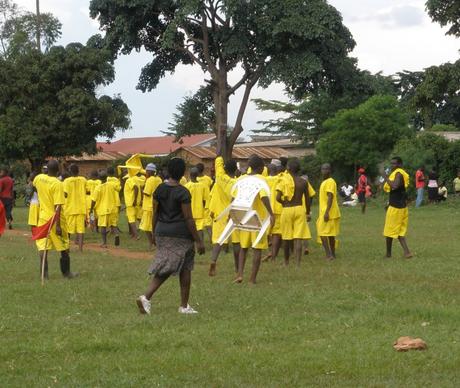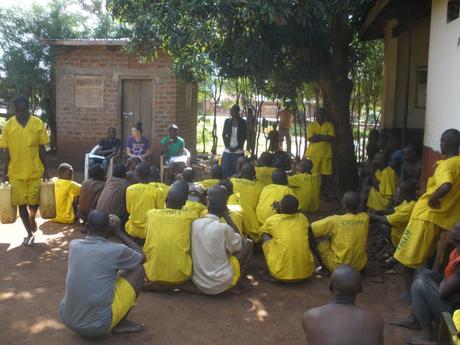In Uganda, I worked in the male prison teaching the prisoners once a week on a range of issues from rights and responsibilities to home farming techniques. These all amounted to Restless Development’s 3 key goals in Uganda: civic participation, livelihood & employment and sexual & reproductive health. One of my best experiences was helping some of these prisoners to find out their HIV status and make sure they were getting the right support.
When we entered into the community it was important for us to organize a big event to get the villages together and let everyone know who we were and what we were up to. So in the first few weeks we organised a community football tournament where the players and spectators would hopefully also test themselves for HIV. There were six teams in total, two boys’ teams from different schools, two girls’ teams from different schools and two community groups (one made up of the prisoners).
The matches were played in a sort of girls and boys league thing with a winning team from each. But when the time came for their match, the prisoners lost against the school team. Even still, they were led back to the prison with huge grins on their faces, arms in the air and chairs toted on their backs as if they had won the whole league.

All went to plan on the day with hundreds of people turning up and testing themselves for HIV. We had also organised for the prisoners to be tested for HIV alone earlier. Shockingly, some of the prisoners had told us that they had been tested before but were given negative results but they thought they had been positive. One man said he knew his negative status was a lie as both of his wives had died from HIV.
It turned out that sadly not everyone at the prison was HIV negative. But, the prisoners who had thought they might have been HIV positive had finally received their closure.
We went back the following week to check up on the prisoners. Those who been diagnosed as positive still had not been able to access the health center yet and had not been given the care or advice they needed. My team of volunteers went to talk to the village health center and asked for a nurse to come and deliver a talk to the prisoners that week. Luckily they had someone available and that Sunday we gathered the prisoners for a talk on HIV all in their local language.

It was really great that the prisoners had no shame in asking questions to the Nurse. They asked questions which in the western world we may take for granted. For example, “When we go to sleep does the HIV virus sleep?” or “If we put on several condoms and then a plastic bag on top does that make us extra safe?” One thing I really enjoyed about the discussion, apart from the honesty of all involved, was that it was fully community based. Rather than volunteers delivering the information the session was led by the village health center.
Furthermore, the health center allowed them a special day to visit every Tuesday which had also been agreed with the Prison Warden. Everyone was so pleased with the results out of this meeting. It was a really profound experience assisting to build a relationship between the health center and the prisoners. This was the ultimate goal for us as it meant that this relationship was sustainable, something that had come out of the community and something they owned.

